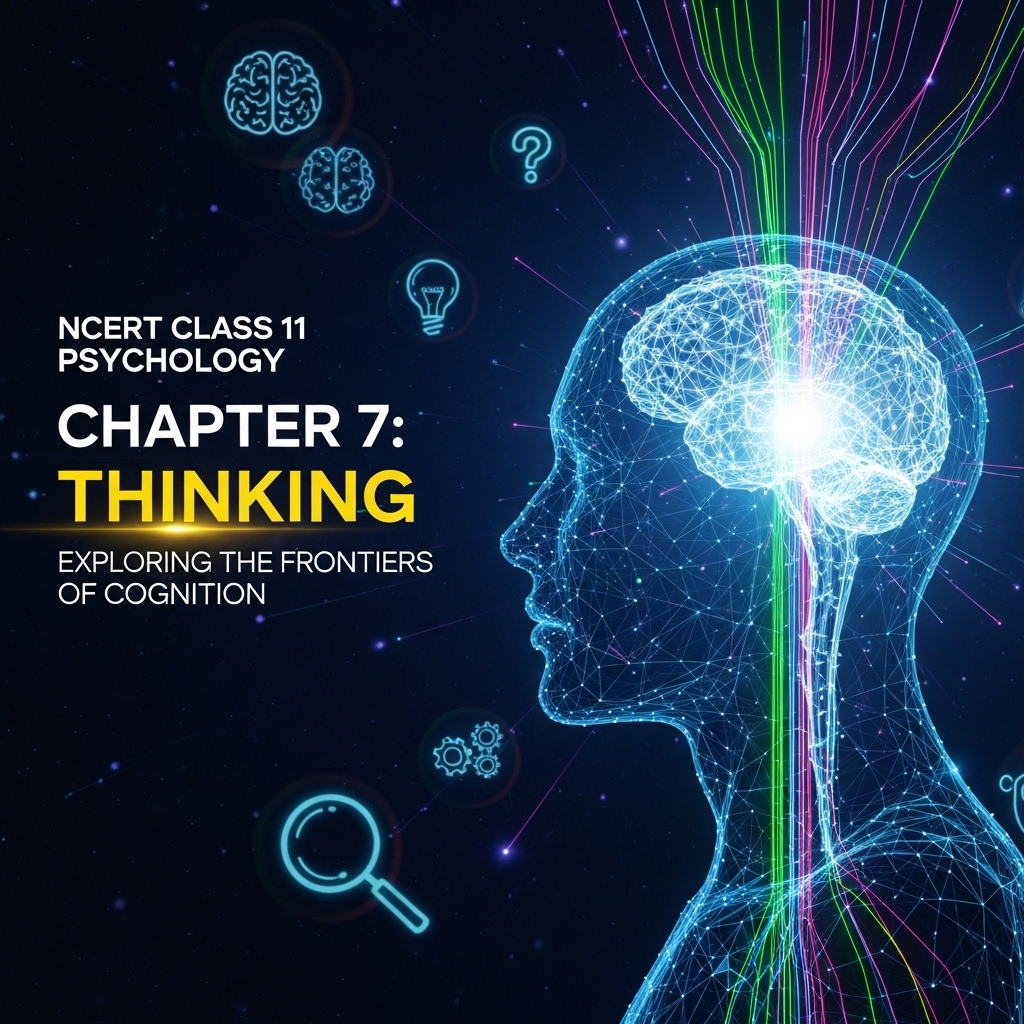Complete Solutions and Summary of Thinking – NCERT Class 11, Psychology, Chapter 7 – Summary, Questions, Answers, Extra Questions
Detailed introduction to thinking processes, including the nature and types of thinking; concepts, problem-solving, reasoning, decision-making, and creative thinking; discusses barriers to effective thinking and strategies for improvement.
Updated: 3 months ago
Categories: NCERT, Class XI, Psychology, Summary, Thinking, Cognition, Reasoning, Problem-Solving, Chapter 7

Thinking
Chapter 7: Psychology - Ultimate Study Guide | NCERT Class 11 Notes, Questions, Examples & Quiz 2025
Full Chapter Summary & Detailed Notes - Thinking Class 11 NCERT
Overview & Key Concepts
- Chapter Goal: Understand nature of thinking/reasoning, cognitive processes in problem solving/decision-making, creative thinking enhance, language-thought relationship, language development/use. Exam Focus: Mental images/concepts, problem solving steps/obstacles, deductive/inductive reasoning, judgment, creative nature/process/strategies, lateral thinking, thought-language interlink, bilingualism. 2025 Updates: Emphasis on cognitive neuroscience, AI in thinking, cultural influences. Fun Fact: Helen Keller quote on advancing from syllable to Shakespeare thought. Core Idea: Thinking manipulates/analyses information; base cognitive activities unique humans. Real-World: Daily like cooking/math; self-talk child/adult problem solving. Ties: To chapters on intelligence, learning, motivation. Expanded: Thinking goal-directed/organised; internal infer from behaviour. Culture shapes; holistic vs analytical. Young discipline but ancient roots philosophy.
- Wider Scope: Levels individual/creative; biological/cultural bases; methods experiments/ecological.
- Expanded Content: Minimizes rigidities; scientific/objective or creative. Indian self-talk; western too. Interfaces cognition/language. Converge creative/problem solving.
Introduction
- Thinking core subject; independent meaning. Use 'think' synonym remember/attention/uncertainty. Psychology: Directed solving/inferring/judging/deciding/choosing.
- Creative thinking nature/characteristics/develop. Relationship language-thought.
- Child building tower talks self; steps/evaluation. Adult similar problem solving. Discuss language development/relationship thought.
- Thinking base human cognition.
- Expanded: Responses bewildering; know others thinking? Psychology contributes understanding human behaviour/well-being. Macro like wars; micro chess moves. Internal processes self-observation.
Nature of Thinking
- Unique humans; manipulation/analysis information environment. Beyond given; create meaning add knowledge. Higher process abstracting/reasoning/imagining/solving/judging/decision.
- Mostly organised/goal-directed; day-to-day goal. Planning/recall steps familiar; infer new.
- Internal mental; infer overt behaviour. E.g., chess player thinking infer from move.
- Expanded: Painting not just colour/lines; interpret relate knowledge. Helen Keller quote syllable to Shakespeare.
Building Blocks of Thought
- Relies knowledge possess; mental images/words.
- Mental Image: Representation sensory experience; think things/places/events. E.g., imagine cat tree; Taj Mahal describe. Useful directions/map reading.
- Activity 7.1: Map observe/locate blank; form image situation.
- Concepts: Mental representation category; class objects/ideas/events common properties. Identify extract characteristics/match existing.
- E.g., apple fruit; table furniture; dog animal. New object match category.
- Need: Organise knowledge; quick/efficient access. Like organised cupboard/library.
- Expanded: Images visual/mental eye. Concepts help time/effort.
Culture and Thinking (Box 7.1)
- Beliefs/values/social practices influence. Study American/Asian; underwater scene. Americans analytical focus main (large fish); Asians holistic background (rocky bottom/green water).
- Expanded: Relationship objects/backgrounds.
The Processes of Thinking
- Uses images/concepts base. Proceeds specific areas: problem solving/reasoning/decision-making.
- Expanded: Mental operations sequence.
Problem Solving
- Goal-directed thinking. Daily activities goal; initial state (problem) end (goal); steps/operations connect.
- Table 7.1: Operations - Identify; Represent; Plan/set sub-goals; Evaluate; Select/execute; Evaluate outcome; Rethink/redefine.
- E.g., organise play Teachers' Day: Identify week left; Represent theme/actors/money; Plan search/consult; Evaluate rehearsal; Select best; Outcome appreciated reference; Rethink better future.
- Obstacles: Mental set - Tendency follow tried operations; rigidity obstructs new. Prior success help/hinder.
- Functional fixedness: Fixed usual function; fail solve. E.g., book hammer overcome.
- Lack motivation: Give up easy/failure; need persist.
- Expanded: Repair cycle/tour/friendship; quick cues or time/effort.
Reasoning
- Gather/analyse information conclusions. Form problem solving; goal determine from given.
- Deductive: General assumption specific. E.g., people run late; man running so late. Assumption true? Invalid if not.
- Inductive: Specific facts general. E.g., observe man enter train bag; conclude left bag.
- Mistakes: Jump without facts; scientific inductive instances general rule.
- Analogy: A:B as C:D; same relation. Help solve identify salient attributes.
- Expanded: Man running platform infer late/bag/see off. Mouse four legs cat invalid.
Decision-making
- Choose alternatives evaluate cost/benefit. Differ problem solving; solutions known select one.
- E.g., subject psychology/economics: Interest/prospects/books/teachers. Differ priorities.
- Judgment: Conclusions/opinions/evaluate based knowledge/evidences. Automatic/habit or effort/reference past.
- E.g., brakes red light automatic; literary text past; painting preferences. Change new info.
- Expanded: Badminton state vs exam; evaluate outcomes. Personal significance.
Nature and Process of Creative Thinking
- Original like planting/wheel/cave drawings. Scientific/technological progress; music/painting/poetry pleasure.
- E.g., Karve smokeless chullah sugarcane; Panwar robot medal.
- Not extraordinary; potential all. Apply any area levels: Writing/teaching/cooking/roles/story/conversation/questions/games/problems/conflicts/organising.
- Everyday creativity perceiving/thinking/solving; different special talent achievements.
- Expanded: Countless examples fields.
Nature of Creative Thinking
- Thinking beyond conventional; novel/original ideas/solutions.
- Characteristics: Divergent; flexible; original; fluent.
- Expanded: Break routines; see new ways.
Lateral Thinking (Box 7.2)
- De Bono; think sideways/unconventional. Provocation/reframe.
- Expanded: Challenge assumptions.
Process of Creative Thinking
- Preparation: Gather info/define problem.
- Incubation: Unconscious work; step away.
- Illumination: Aha! Insight sudden.
- Verification: Test/refine idea.
- Expanded: Wallas stages.
Strategies for Creative Thinking
- Brainstorming; mind mapping; attribute listing; analogies.
- Encourage curiosity/questioning; diverse experiences; persistence.
- Expanded: Overcome blocks fear failure/conformity.
Thought and Language
- Interdependent; thought influences language; language shapes thought.
- Piaget: Thought first; language represents.
- Vygotsky: Language social; internalises thought.
- Whorf: Linguistic relativity; language determines perception/thought.
- Expanded: Self-talk thinking; bilingual advantages.
Development of Language and Language Use
- Stages: Babbling; holophrase; two-word; telegraphic; full sentences.
- Influences: Biological (Chomsky LAD); environmental interaction.
- Use: Communication/social/cognitive.
- Expanded: Critical period; overgeneralisation errors.
Bilingualism and Multilingualism (Box 7.3)
- Advantages: Cognitive flexibility; metalinguistic awareness; better problem solving.
- India multilingual context.
- Expanded: Delays dementia; cultural benefits.
Summary
- Thinking manipulation/analysis info; images/concepts.
- Problem solving steps/obstacles; reasoning deductive/inductive/analogy; decision evaluate choices.
- Creative divergent; process preparation/incubation/illumination/verification; strategies enhance.
- Thought-language interlink; development stages; bilingual benefits.
Why This Guide Stands Out
Complete: All subtopics, examples, Q&A, quiz. Psychology-focused. Free 2025.
Key Themes & Tips
- Aspects: Cognitive processes, creative enhancement, language-thought.
- Thinkers: Piaget, Vygotsky, Whorf, De Bono, Wallas.
- Tip: Distinguish mental set/functional fixedness; deductive/inductive; creative stages; language theories.
Exam Case Studies
Chess thinking, tower building child, culture box examples.
Project & Group Ideas
- Observe child solving puzzle; note self-talk/steps.
- Group brainstorm creative solutions daily problem.
- Interview bilingual on advantages.

Group Discussions
No forum posts available.


